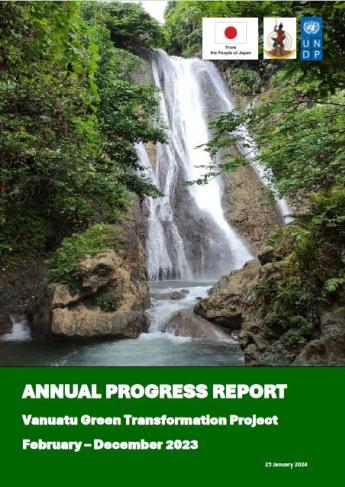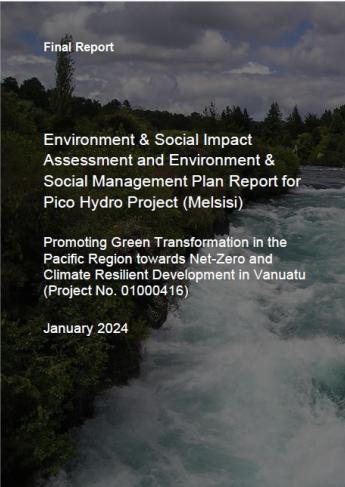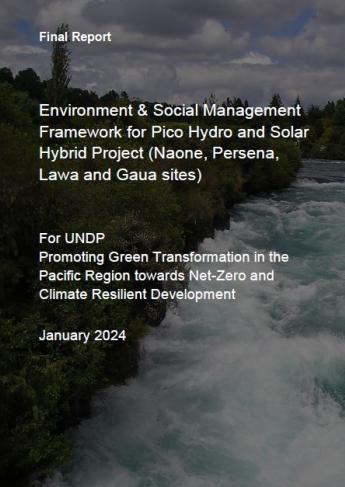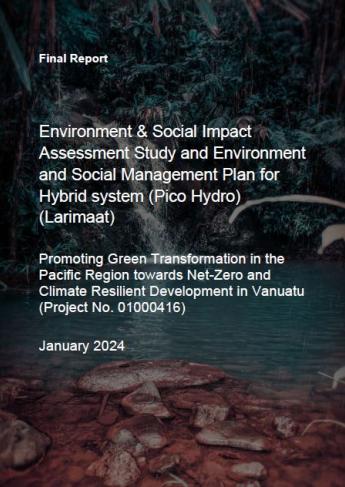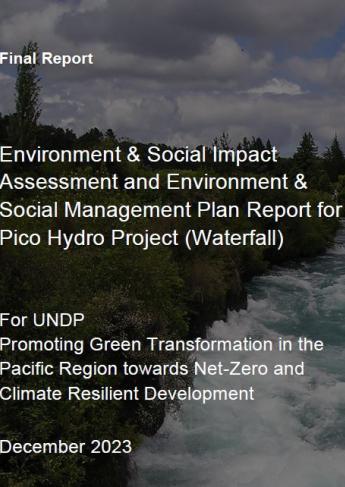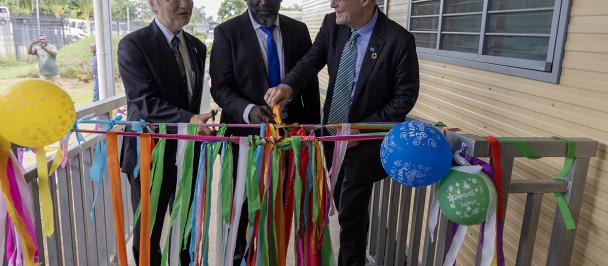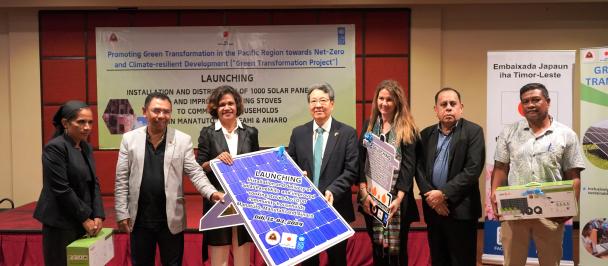PACIFIC GREEN TRANSFORMATION PROJECT
Project for Promoting Green Transformation in the Pacific Region towards Net-zero and Climate-resilient Development
| Status: | Closed |
| Duration: | February 2023 - December 2025 |
| Budget: | USD 37.5 million |
| Donor: | Government of Japan |
| Coverage: | Papua New Guinea, Samoa, Timor-Leste, and Vanuatu |
| Focus Area: | Environment and Energy |
| Partners: | National Governments, UN Agencies, Civil Society, Women and Youth Associations and the Private Sector |
| See more information about the project on the transparency portal. | |
Background
With every 0.1 degree rise in the average global temperature, the threats from climate-induced disasters increase disproportionately affecting fragile ecosystems, impacting socioeconomic systems, and fueling instability and volatility.
Small Island Developing States (SIDS) are on the frontlines of the climate crisis. At COP26 SIDS leaders stated that climate action is a matter of survival for these nations, that are facing more frequent and extreme weather events causing devastating damage to the environment, human life, and economies.
Therefore, climate mitigation and adaptation actions are paramount, and access to finance is at the heart of climate action. SIDS are highly vulnerable due to their dependence on imports of goods, services, energy supply, and economies that lack diversification.
The COVID-19 pandemic and impacts from the war in Ukraine have exacerbated these vulnerabilities, decimating tourism, intensifying socio-economic shocks, increasing food insecurity, and raising the costs of fossil fuels, resulting in aftershocks felt across the SIDS that are expected to persist for years.
The need for new growth strategies is critical to address multi-dimensional socio-economic risks, to shift to sustainable development to reduce the reliance on fossil fuels, drive economic growth, and help people cope with the impacts of climate change.
UNDP has been supporting countries to promote green growth, build resilience to crises, and respond to the growing adaptation and mitigation needs through several initiatives including its flagship Climate Promise initiative. The initiative, the biggest of its kind, supports developing countries in delivering their national climate pledges, namely Nationally Determined Contributions (NDC), that set emission reduction targets.
Summary
The 4-countries project funded by the Government of Japan, is being implemented under the overarching goal of the Climate Promise framework. Lessons learned from the Climate Promise initiative will enrich the implementation process of the Pacific Green Transformation Project. The country-level climate actions and investments have been developed based on country-specific contexts to best realize their green transformation ambitions for a more inclusive, gender-responsive, and climate-resilient future.
The Pacific Green Transformation Project is helping communities in Papua New Guinea, Samoa, Timor-Leste, and Vanuatu switch to renewable energy, reduce fossil fuel dependence, and create sustainable, green solutions for future generations.
Objective
The Pacific Green Transformation Project aims to advance climate action through innovation, helping communities build resilience, and adapt to climate risks, by providing access to renewable energy, for the most vulnerable to overcome a persistent energy crisis and drive green transformation across the Pacific and beyond.
Key Achievements
- The Pacific Green Transformation Project is contributing to drive progress in renewable energy, grid integration, and transport decarbonization, while aligning Pacific priorities with the NDC 3.0 process. For example, it is supporting the development of micro-grid regulations in Papua New Guinea, renewable energy legislation in Timor-Leste, prosumer regulations in Samoa, and a comprehensive energy capacity plan in Vanuatu.
- The project supported a series of high-level events, webinars, and technical workshops aimed at accelerating green transformation and promoting sustainable, climate-resilient actions across the region, including: capacity-building webinars on green investment, a regional gender workshop, a knowledge exchange at the 10th Pacific Islands Leaders Meeting (PALM10), the NDC 3.0 Regional Forum in Samoa, regional knowledge sharing workshop on green transformation actions, and energy training in Timor-Leste.
- The Project is encouraging positive behavioral change by investing in communications and advocacy initiatives aimed at encouraging individuals to adopt lifestyles that support renewable energy and green transformation. To highlight the urgent need for climate action, the project produced a Pacific Green Transformation video series, aimed not only to inform but also to build greater understanding and empathy, encouraging global audiences to support sustainable initiatives for these vulnerable regions.
Papua New Guinea (PNG)
Pacific Green Transformation Project
Papua New Guinea aims to provide electricity to 70 percent of its population by 2030, through renewable energy. This goal is central to achieving the country’s NDCs. Most communities are in rugged, remote, and mountainous terrain, where setting up primary grid connections would be complicated and expensive. Access to more affordable forms of off-grid renewable energy will significantly improve the livelihoods of communities and people, especially women and youth. By pursuing greener income generation options, PNG would leapfrog outdated fossil fuel technologies and accelerate reductions in emissions to meet its NDC target. The Pacific Green Transformation Project will install 3 micro solar farms in off-grid communities in the Autonomous Region of Bougainville.

Samoa
GREEN TRANSFORMATION INITIAVE
CAP-IT PROJECT
Currently, Samoa’s transportation sector is heavily dependent on fossil fuels and is the country’s largest emitter of CO2. Samoa needs to quickly pivot to renewable energy to try to reach zero-emission across both land and maritime transport systems, to achieve its Paris Agreement goals. Through the Pacific Green Transformation Project, Samoa envisions a major shift to green and low-carbon transportation by investing in the adoption of electrical vehicles and outboard motors. The project takes a comprehensive gender-sensitive and inclusive approach, based on the principle of leaving no one behind.

Timor-Leste
Pacific Green Transformation Project
Timor-Leste commits to scaling up investment in renewable energy systems and use of low-carbon technologies to reduce diesel consumption while simultaneously, improving the resilience of rural communities. By ensuring access to reliable and clean energy, the project will provide solar power to community health centers and the National Medical Storage, a warehouse that holds the country’s medicines and medical supplies for the entire country. The project will also provide off-grid solar-powered lighting and improved cooking stoves to 1,000 households not yet connected to the national grid, which will significantly reduce the consumption of firewood. Additionally, it will renovate and set up 15 solar-powered ICT labs in secondary, and vocational schools.
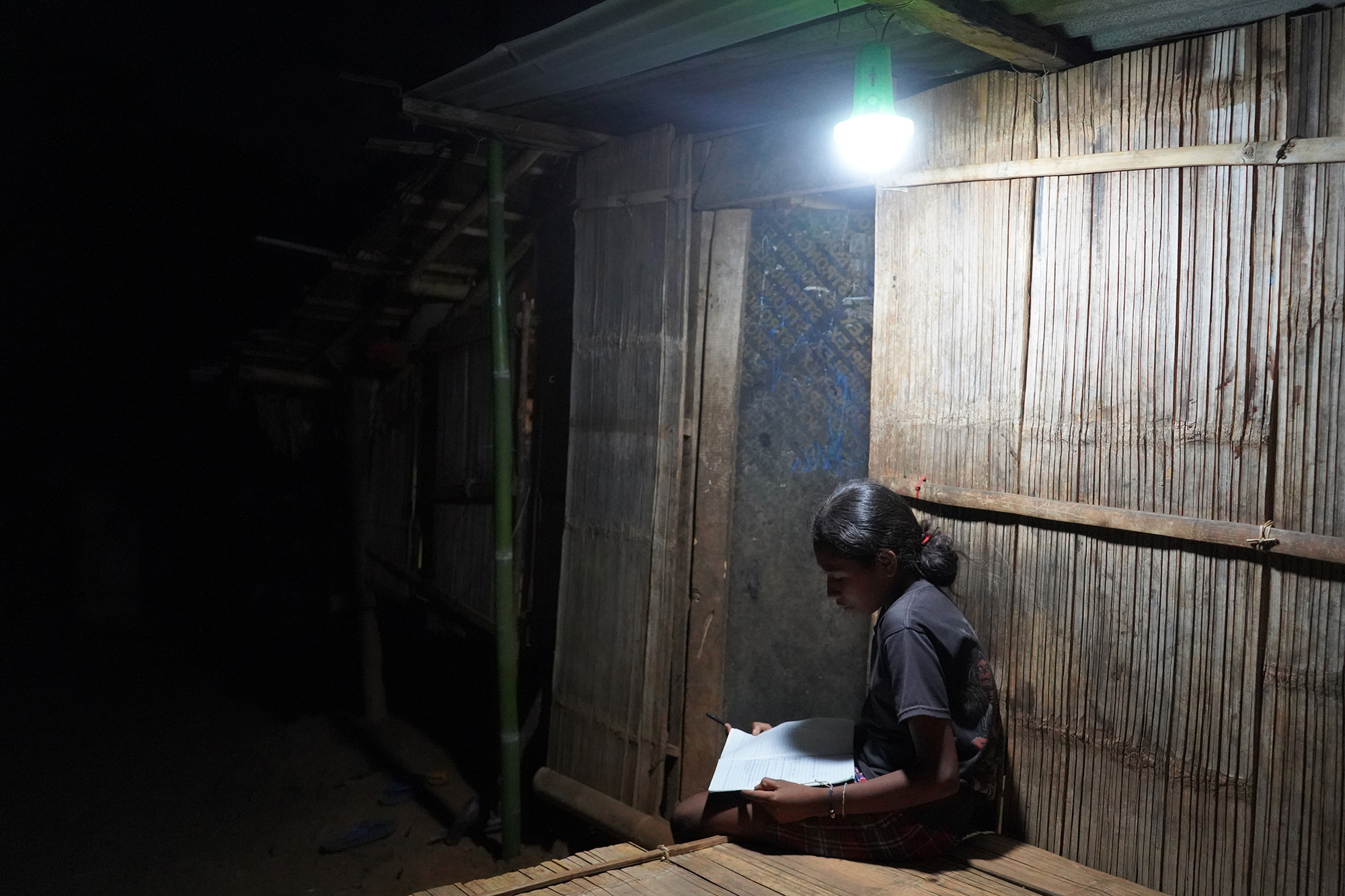
Vanuatu
Pacific Green Transformation Project
Vanuatu’s 2017 census indicates that 71 percent of the nation’s roughly 280,000 people lack access to electricity. As per the census, over half of those offgrid households have no access to power besides a solar lantern. In its National Energy Road Map (NERM), the country aims to achieve 100 percent electrification with renewable energy by 2030. Through the Pacific Green Transformation Project, pico-hydro power stations will be established in selected locations to provide reliable energy sources in communities and also to contribute to the government’s efforts in achieving its NERM commitment.
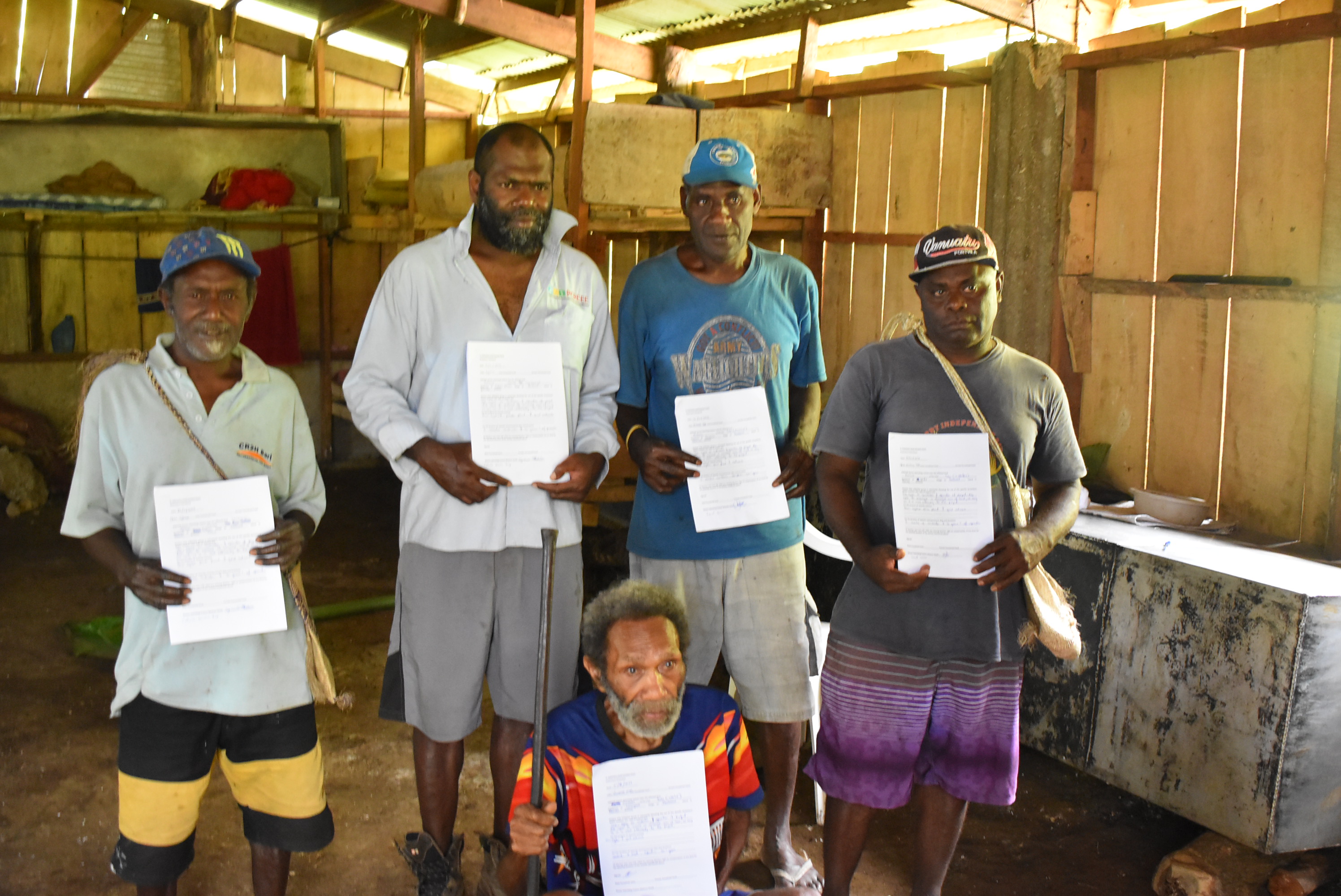
South-South and Triangular Cooperation
To ensure the sustainability and scalability of the Pacific GX project's outcome, the efforts will be diverted to building regional cooperation in various forms through South-South and Triangular Cooperation (SSTC). The SSTC proved to be an important tool for empowering developing countries by facilitating knowledge sharing, capacity development, and promoting production networks by fostering culturally relevant solutions. This is not merely an exchange of financial and economic resources among nations in the global south, but multifaceted cooperation to achieve transformative change by enabling each other's potential for shared prosperity. By weaving a tapestry of collaboration and shared understanding, the SSTC component of the project envisions a ripple effect that extends far beyond the project's immediate scope. It aims to inspire a culture of continuous learning, adaptation, and innovation— a culture where the participating nations become not just beneficiaries but key actors in shaping a sustainable and resilient future. The SSTC component implementation includes cooperation with various relevant stakeholders performing a wide range of interventions. The main directions of the implementation process include
- Regional and country-level policy dialogue meetings and workshops;
- The facilitation of a key stakeholders' and regional officials' platform to promote continued dialogue and strong country ownership; and
- Modalities to strengthen knowledge-sharing activities in a range of themes related to environmental resilience improvement measures.
These processes intend to create a viable framework to address emerging risks, institutional and policy shortcomings, knowledge and technical gaps via improved domestic expertise, technical capacity, and, as a result, increased confidence, and commitments to achieve renewable energy targets and energy efficiency.
Pacific Green Transformation Infographics: Understanding Renewable Energy Together
Impact Stories
Blogs
Video Gallery
Publications
In the News
- 200 SAMOAN WOMEN TO RECEIVE FREE DRIVING AND EV AWARENESS TRAINING
[Date: 15 October 2025, Source: Government of Samoa] - 200 Samoan Women Receive Free Driving & EV Awareness Training
[Date: 15 October 2025, Source: Talamua Online News] - 76 electric vehicles launched
[Date: 03 October 2024 Source: Samoa Observer] - ‘What are those green things 'National University of Samoa Associate Professor Anita Latai Niusulu, Explains 'Just Green Transition in Samoa'
[Date: 18 July 2024 Source: Newsline Samoa] - Project to make transportation in Samoa ‘greener’ now underway
[Date: 29 June 2023 Source: Newsline Samoa]
Contact Information
UNDP Bangkok Regional Hub
Regional Project Management Unit
Simbotwe Mwiya
simbotwe.mwiya@undp.org

 Locations
Locations























































